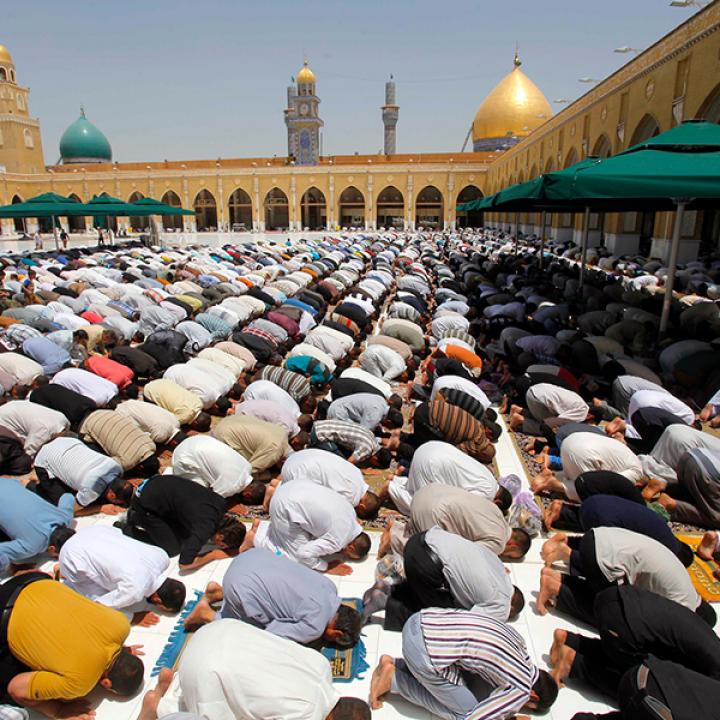

September 5, 2017
Recently, another controversy erupted over a one-hour sermon delivered at the Islamic Center of Davis in California by Imam Ammar Shahin. His words sounded hateful and anti-Jewish in tone bidding to "liberate Al- Aqsa mosque from the filth of the Jews. Annihilate them down to the very last one." Other examples of such Muslim sermons abound. In Jerusalem, at Al-Aqsa Mosque, preacher Omar Abu-Sarah stated in one of his sermons, “I say to the Jews loud and clear: The time for your slaughter has come.” In Montreal, Canada, Sheikh Muhammad bin Musa Al Nasr delivered a sermon in Dar Al-Arqam Mosque in which he asked for Jews to be killed. The imam recited in Arabic the saying attributed to the Prophet: "O Muslim, O servant of Allah, there is a Jew behind me, come and kill him."
Often in such sermons, preachers cite this Hadith predicting an apocalyptic battle based on theological teachings that on the eve of Judgment Day Muslims would annihilate Jews. Rocks and trees will callout to Muslims and say, “O Muslim, there is a Jew hiding behind me, come and kill him.” This presumed Hadith is one of more than 10,000 collected 150 years after the death of the Prophet; the authenticity of such a Hadith is disputed this particular Hadith has become controversial for promoting anti-Jewish sentiments among Muslims, providing a presumed pretext for racism and bigotry. In provoking genocide against the Jews, those few preachers are pursuing faith in the very manner against which the Quran warned. These hate sermons are not indicative of the values of Islam or what it means to be a Muslim. Such sermons openly promote concepts that directly contradict those of a liberal society. They resist progression and increase discontent, leading to more terror attacks against innocent civilians. They threaten friendly, communal relationships, stirring suspicions of Muslims in a fragile world.
In reaction to hate sermons delivered by preachers and religious leaders, hate crimes taking place against the other became inevitable, especially with the rise of social media accounts glorifying violence and encouraging violent attacks. It is completely unacceptable. Not only against the faith; it is also against the law. Hate speech that aims to inflict injury on people does not typically fall under freedom of speech protection.
Unless stopped, the likelihood of a bloody conflagration within multi-cultural communities is very high. Stopping this phenomenon should be a priority not only of Jews, but of Muslims, Christians, and others.
Blaming Islam, denouncing the sermons, seeking apologies, filing police complaints, and launching petitions against the imams calling for their dismissal or deportation will not help alone, but supporting moderate Islamists to spread their message of tolerance and peaceful coexistence will. The rhetoric of radical and evil ideology offered in a religious wrapping can only be successfully challenged and undermined by promoting a moderate, liberal Muslim ideology referred to as wasatia, or “middle ground.” Wasatia is a term extracted from the Quran: “Thus have We made of you justly balanced nation” (al-Baqarah 2:143). Islam, as advocated by Wasatia, embraces justice, temperance, balance, tolerance, and religious liberty for all, and puts freedom of religion above that of religious identity.
As its reference, Wasatia refers to the Holy Quran, which explicitly condemns murder, stating, “Whoever kills a soul it is as if he has slain all humanity” (al-Maidah 5:32) and, “So if they withdraw and do not fight you, and offer you peace, then God gives you no way against them” (an-Nisa 4:90).
Islam has a well-established tradition of moderation, reconciliation, and peace resisting the forces of evil. Islamic teachings are peaceful and consistently emphasize kindness, compassion, and respect for others, and steering clear of aggression. In the words of the Quran, “God instructs you to deal kindly and justly with anyone who has not fought you for your faith or driven you out of your homes: God loves the just” (al-Mumtahana 60:8). This verse encourages good relations with all faiths, sects, and creeds, and prohibits harming others.
Wasatia amplifies the voices of open-minded liberal Muslims practicing interfaith reconciliation through dialogue and cooperation.
Moderate Muslims need to call on radical Muslims to come out and embrace diversity and pluralism, and to speak out against the inexcusable misinterpretation of the faith and the manipulation of innocent worshipers.
In voicing our concern, we hope to bring the Muslim community together to publicly denounce calls for genocide against other faiths. In voicing a deeply passionate call to end using mosque pulpits, or any pulpit, for advocating violence that could ultimately lead to genocide, Wasatia aims to create a more humanistic future.



